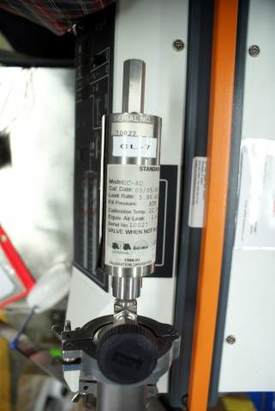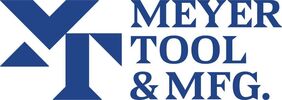Call: 708-425-9080
Helium Leak Detection: What is a calibrated leak?
 Calibrated leak mounted on leak detector.
Calibrated leak mounted on leak detector.
Calibrated leaks are used for calibrating helium leak detectors. The most common type (and the type used by Meyer Tool) for this purpose is the reservoir type. This type of calibrated leak is generally in the 10-7 to 10-8 std-cc/sec helium range.
A calibrated leak is a device consisting of a reservoir of helium gas contained within a metal—typically nickel-plated carbon steel or aluminum cylinder with a hollow pyrex-glass tube through its center and an isolation valve. Helium gas at atmospheric pressure in the reservoir permeates through the pyrex-glass tube. The permeation rate is dependent on the pressure of helium on each side of the pyrex-glass tube and on the thickness and temperature of the glass. Calibrated leaks are designed to permeate a known amount of helium gas with the reservoir at atmospheric pressure, the calibrated leak open to vacuum and the calibrated leak at 22 C (71.6 F).
When not in use the isolation valve of a calibrated leak should be left open. If it is left closed, helium gas will leak into the space between the pyrex-glass tube and the valve, causing an initial erroneous high reading when the calibrated leak is first exposed to the vacuum at the inlet of the leak detector.
Over long periods of time depletion of helium in a calibrated leak can occur. However this effect is well within the calibration tolerance of the leak over a normal recalibration cycle. Because calibrated leaks are delicate instruments, they should be placed on a regular calibration cycle. Meyer Tool recalibrates calibrated leaks on a biannual basis to NIST traceable standards. A more important effect is temperature, which is in the order of 3% per degree Celsius from the calibration temperature. Keep in mind however that 3% of your typical 10-8 leak is only 3x10-10.
Good helium leak test practice requires calibration of the leak detector before and after each test period. (When testing a single item this would mean before and after the test, when testing multiple items this would likely mean before beginning testing and at the end of the testing shift.) The manual supplied with the helium leak detector provides the precise steps for tuning and calibration. Calibration of most leak detectors built prior to 1990 involved a number of manual steps. Since then calibration procedures are much simplified and involve some variation of the following.
If this article was of interest to you, drop us a line and let us know. Your feedback will help us determine what type of content you would like to see in our newsletter and posted to the website.
A calibrated leak is a device consisting of a reservoir of helium gas contained within a metal—typically nickel-plated carbon steel or aluminum cylinder with a hollow pyrex-glass tube through its center and an isolation valve. Helium gas at atmospheric pressure in the reservoir permeates through the pyrex-glass tube. The permeation rate is dependent on the pressure of helium on each side of the pyrex-glass tube and on the thickness and temperature of the glass. Calibrated leaks are designed to permeate a known amount of helium gas with the reservoir at atmospheric pressure, the calibrated leak open to vacuum and the calibrated leak at 22 C (71.6 F).
When not in use the isolation valve of a calibrated leak should be left open. If it is left closed, helium gas will leak into the space between the pyrex-glass tube and the valve, causing an initial erroneous high reading when the calibrated leak is first exposed to the vacuum at the inlet of the leak detector.
Over long periods of time depletion of helium in a calibrated leak can occur. However this effect is well within the calibration tolerance of the leak over a normal recalibration cycle. Because calibrated leaks are delicate instruments, they should be placed on a regular calibration cycle. Meyer Tool recalibrates calibrated leaks on a biannual basis to NIST traceable standards. A more important effect is temperature, which is in the order of 3% per degree Celsius from the calibration temperature. Keep in mind however that 3% of your typical 10-8 leak is only 3x10-10.
Good helium leak test practice requires calibration of the leak detector before and after each test period. (When testing a single item this would mean before and after the test, when testing multiple items this would likely mean before beginning testing and at the end of the testing shift.) The manual supplied with the helium leak detector provides the precise steps for tuning and calibration. Calibration of most leak detectors built prior to 1990 involved a number of manual steps. Since then calibration procedures are much simplified and involve some variation of the following.
- Start the leak detector and allow it to run per the manual's prescribed minimum warm up time.
- Close the valve on the calibrated leak and connect the calibrated leak to the inlet of the detector.
- Press the cycle start button, wait for the leak detector to reach fine leak test mode.
- Open the valve on the calibrated leak, wait for the leak detector helium signal to stabilize.
- Adjust the helium peak and set point adjustment dial so the gauge indicates the value of the calibrated leak.
- Press the cycle button to end the calibration cycle.
- Disconnect the calibrated leak from the detector.
If this article was of interest to you, drop us a line and let us know. Your feedback will help us determine what type of content you would like to see in our newsletter and posted to the website.



